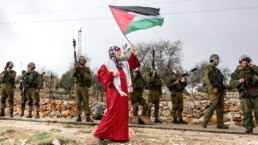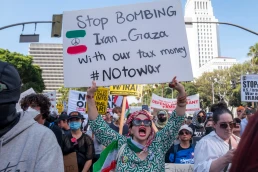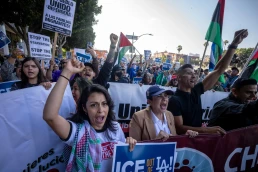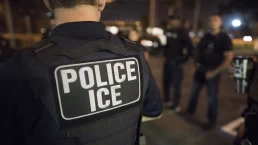This indifference and silence towards you and your struggle beg crucial questions about the true commitment to the universal values of feminism and the need for a more principled stance by champions of equality.
By Hanieh Jodat
To my Palestinian sisters,
Despite the global rise of the feminist liberation movement launched decades ago to amplify the voices of women, there exists a troubling disconnect and indifference towards your pain and cries. It seems as though the movement for women’s equality and the right to self-determination or emancipation was intended to uplift a specific group of women, while excluding and overlooking others.

I often wonder if this disconnect is rooted in the hatred for women whose skin color, religion, or class doesn’t qualify them worthy of the same fight. I often wonder if this disconnect is rooted in racism towards an entire population that was meant to be erased as their lands and homes were taken under occupation.
This indifference and silence towards you and your struggle beg crucial questions about the true commitment to the universal values of feminism and the need for a more principled stance by champions of equality. But is it too late? How is it that the principles that underpin feminist ideas—equality, justice, and human rights for ALL women—seem to be conveniently set aside when it comes to specific geopolitical hotspots?
It is important to highlight that in the chilling aftermath of over 150 days of brutal warfare between Israel and Hamas, over 30,000 innocent Palestinian civilians have been killed, and millions continue to suffer in the barbaric crossfire and siege. Among the significant civilian casualties, over 25,000 women and children have fallen victim as the number of bodies trapped under rubble continues to rise. The destruction has displaced more than 950,000 women and girls, with a horrifying statistic revealing that every two hours, a Palestinian mother dies, making Gaza one of the most dangerous places for a mother and her children.
Additionally, the trauma of giving birth in a war zone where the majority of women suffer from anemia and lack proper nutrition, sanitation, and simple privileges such as privacy while giving birth has created an unfathomable psychological condition. Prior to October 7, maternity hospitals in Gaza were few and far between, with the capacity for ten births per day. Now the hospitals remaining are doing eighty, or sometimes even a hundred births. Women in Gaza are delivered in the corridors, and can stay for only a few hours after a vaginal birth and Cesarean Section before they are sent out to their tent and shelters.
Do Palestinian mothers and their children receive the same protection as others under U.N. General Assembly Resolution 3318 (XXIX), the “Declaration on the Protection of Women and Children in Emergency and Armed Conflict”? This resolution explicitly states that “All States shall abide fully by their obligations under the Geneva Protocol of 1925 and the Geneva Conventions of 1949, as well as other instruments of international law relative to respect for human rights in armed conflicts, which offer important guarantees for the protection of women and children.”
Humanitarian organizations highlight a cruel and dire humanitarian crisis in Gaza, calculating the number of average deaths per day for Gaza could possibly surpass any other major armed conflict, which includes Syria, Iraq, Sudan, Yemen, Ukraine, and Afghanistan. The very recent International Court of Justice’s ruling, which found plausible evidence of genocide, has done nothing to quell the ongoing bombardment and destruction of the largest concentration camp, which continues with no end in sight. More than half of Gaza’s population seeks shelter in overcrowded conditions near the Egyptian border of Rafah, where basic necessities such as clean water and sanitary products like pads become increasingly scarce. Israel, meanwhile, continues to restrict the flow of humanitarian aid. I have often wondered why my sisters in the West who rose up against decades of misogyny in the U.S. in 2016 after the election of Trump, who filled the streets of this nation and internationally rose up to yet again bring attention to the plight of women’s struggles, have remained so quiet. Where is the outrage of our female politicians or their calls for an immediate ceasefire?
As we celebrate Women’s International Month, bell hooks’ quote from “Ain’t I a Woman” comes to mind. Hooks says, “If women want a feminist revolution—ours is a world that is crying out for feminist revolution—then we must assume responsibility for drawing women together in political solidarity. That means we must assume responsibility for eliminating all the forces that divide women.” Hooks notes that American women, universally conditioned by societal norms, adopt biases of sexism, racism and classism, to certain extents. She suggests that by simply adopting the label of feminists these ingrained biases are not eliminated; rather, it demands an intentional effort to actively counteract the negative effects of socialization and work towards dismantling its enduring legacy at all cost. For the past 75 years we have not heard Western feminists question why Palestinian mothers have to witness their children’s imprisonment without due process, why they have to watch their children starve to death under the occupation, and why Palestinian mothers do not get the same sympathy, when they have to continue to bury their children as a result of war and destruction.
To my sisters in Palestine, to Rania Abu Anza, who waited for 10 years for the arrival of her twins, only to have to bury them as a result of an Israeli airstrike, to Hind’s mother Wissam Hamadah, who awaited the arrival of her little girl while holding her pink backpack and her drawing pad, to Bisan Owda, to Dr. Amira Al-Assouli, to every Palestinian grandmother displaced, mother mourning the loss of her family, to every Palestinian daughter, I am sorry, we have failed you.
Hanieh Jodat is a political consultant and a strategist with Defuse Nuclear War (RootsAction). Jodat is a founding member of Women’s March Los Angeles.
Recent Posts
Is A Citizens United 2.0 Right Around The Corner?
July 15, 2025
Take Action Now Is it possible for American democracy to be further degraded by the influence of billionaires? Thanks to champion of the working…
U.S. Leaders Gave Up On Diplomacy With Iran. We Must Make Them Return To It.
July 15, 2025
Take Action Now Building an antiwar movement means preventing the systemic U.S. aggression that creates the conditions for war.By Hanieh Jodat,…
What To Do When You See ICE In Your Neighborhood
July 14, 2025
Take Action Now How can you deter the Trump administration’s immigrant deportation machine when it pops up in your community? Follow these…
ICE Campaign Of Violence Will Lead To More Deaths
July 14, 2025
Take Action Now Jaime Alanis’s death shows the horrific consequences of a secret police force behaving with utter impunity.By Natasha Lennard, The…




